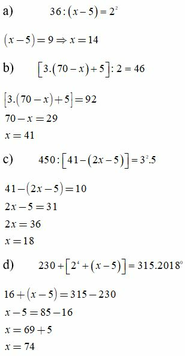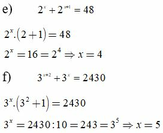
Hãy nhập câu hỏi của bạn vào đây, nếu là tài khoản VIP, bạn sẽ được ưu tiên trả lời.



a, 36:(x–5) = 2 2
(x–5) = 9
x = 14
b, [3.(70–x)+5]:2 = 46
[3.(70–x)+5] = 92
70–x = 29
x = 41
c, 450:[41–(2x–5)] = 3 2 .5
41–(2x–5) = 10
2x–5 = 31
2x = 36
x = 18
d, 230+[ 2 4 +(x–5)] = 315. 2018 0
16+(x–5) = 315–230
x–5 = 85–16
x = 69+5
x = 74
e, 2 x + 2 x + 1 = 48
2 x .(2+1) = 48
2 x = 16 = 2 4
x = 4
f, 3 x + 2 + 3 x = 2430
3 x . 3 2 + 1 = 2430
3 x = 2430:10 = 243 = 3 5
x = 5

Ta có: \(10x+23=5\left(2x+1\right)+18\)
Để\(10x+23⋮\left(2x+1\right)\)thì \(18⋮\left(2x+1\right)\Rightarrow2x+1\inƯ\left(18\right)\)Mà \(2x+1\in N\)và 2x+1 là số lẻ
\(\Rightarrow2x+1\in\left(1;3;9\right)\)
\(\Rightarrow x\in\left(0;1;4\right)\)
Vậy...............................................

10x +23 - 5(2x+1) = 18 chia hết cho 2x+1
suy ra x = 1, hoặc 4 hoặc 0


f) \(\frac{2x-1}{21}=\frac{3}{2x+1}\)( ĐKXĐ : \(x\ne-\frac{1}{2}\))
\(\Leftrightarrow\left(2x-1\right)\left(2x+1\right)=21\cdot3\)
\(\Leftrightarrow4x^2-1=63\)
\(\Leftrightarrow4x^2=64\)
\(\Leftrightarrow x^2=16\)
\(\Leftrightarrow x^2=\left(\pm4\right)^2\)
\(\Leftrightarrow x=\pm4\)(tmđk)
h) \(\frac{10x+5}{6}=\frac{5}{x+1}\)( ĐKXĐ : \(x\ne-1\))
\(\Leftrightarrow\left(10x+5\right)\left(x+1\right)=6\cdot5\)
\(\Leftrightarrow10x^2+15x+5=30\)
\(\Leftrightarrow10x^2+15x+5-30=0\)
\(\Leftrightarrow10x^2+15x-25=0\)
\(\Leftrightarrow5\left(2x^2+3x-5\right)=0\)
\(\Leftrightarrow2x^2+3x-5=0\)
\(\Leftrightarrow2x^2-2x+5x-5=0\)
\(\Leftrightarrow2x\left(x-1\right)+5\left(x-1\right)=0\)
\(\Leftrightarrow\left(x-1\right)\left(2x+5\right)\)
\(\Leftrightarrow\orbr{\begin{cases}x-1=0\\2x+5=0\end{cases}}\Leftrightarrow\orbr{\begin{cases}x=1\\x=-\frac{5}{2}\end{cases}}\)(tmđk)
f) \(\frac{2x-1}{21}=\frac{3}{2x+1}\)
\(\Leftrightarrow\left(2x-1\right)\left(2x+1\right)=21.3\)
\(\Leftrightarrow4x^2-1=63\)
\(\Leftrightarrow4x^2=64\)
\(\Leftrightarrow x^2=16\)\(\Leftrightarrow x^2=4^2\)\(\Leftrightarrow x=4\)
Vậy \(x=4\)
h) \(\frac{10x+5}{6}=\frac{5}{x+1}\)
\(\Leftrightarrow\left(10x+5\right)\left(x+1\right)=5.6\)
\(\Leftrightarrow5\left(2x+1\right)\left(x+1\right)=30\)
\(\Leftrightarrow\left(2x+1\right)\left(x+1\right)=6\)
\(\Leftrightarrow2x^2+3x+1=6\)
\(\Leftrightarrow2x^2+3x-5=0\)
\(\Leftrightarrow\left(2x^2-2x\right)+\left(5x-5\right)=0\)
\(\Leftrightarrow2x\left(x-1\right)+5\left(x-1\right)=0\)
\(\Leftrightarrow\left(x-1\right)\left(2x+5\right)=0\)
\(\Leftrightarrow\orbr{\begin{cases}x-1=0\\2x+5=0\end{cases}}\Leftrightarrow\orbr{\begin{cases}x=1\\2x=-5\end{cases}}\Leftrightarrow\orbr{\begin{cases}x=1\\x=\frac{-5}{2}\end{cases}}\)
Vậy \(x\in\left\{\frac{-5}{2};1\right\}\)

a) 12x - 10x + x = 24
x(12-10+1) =24
x3 =24
x =24:3=8
b)22x-1 - 7 = 1
22x:2-7 =1
4x:2 =1+7
4x =8.2
4x =16
ma 4.4=16
=>x=2
12x - 10x + x = 24
(12-10+1) . x = 24
3 . x = 24
x = 24 : 3
x = 8
Vậy x = 8
----------------------------------
22x-1 - 7 = 1
22x-1 = 1+ 7
22x-1 = 8
Ta thấy : 8 = 2.2.2 ( 3 lần số 2 )
suy ra : 2x-1 =3
2x = 3+1
2x = 4
x = 4 : 2
x = 2
Vậy x = 2


= (x + x + ... + x) + (1+2+..+10)
Vế trước = N, vế sau = M
Số số hạng M = N là: (10-1):1+1 = 10 số hạng
Tổng M: (10+1).10:2 = 55
Ta có:
x.10 + 55 = 230
x.10 = 230 - 55
x.10 = 175
x = 175:10
x = 17,5